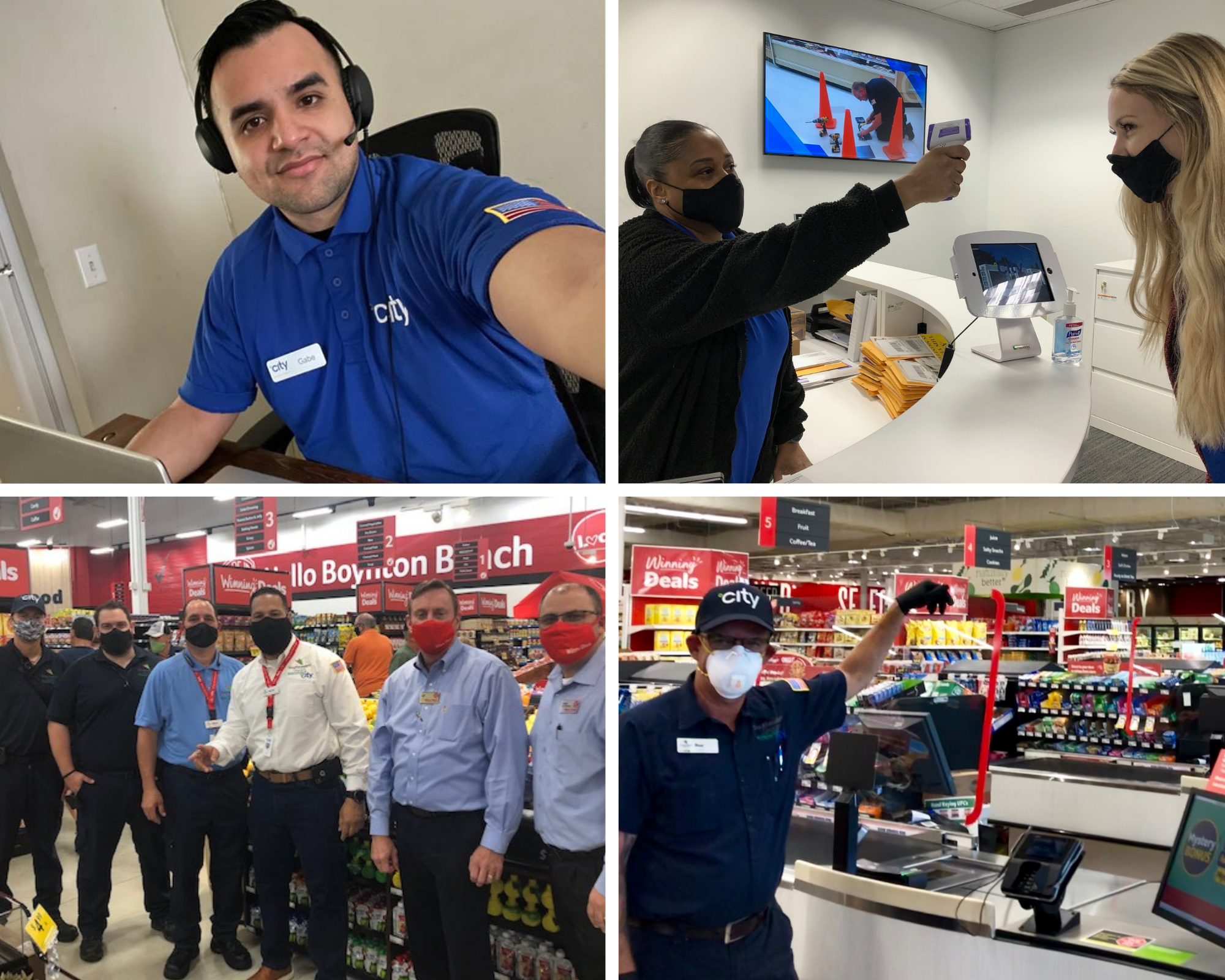
As the world passes the second anniversary of the COVID-19 shutdown, businesses are optimistic as they are starting to recover from the pandemic. While most regions have largely adjusted to living with, and now moving past, the worst of the COVID-19 pandemic, disruptions continue to impact people and businesses in more ways than one. Like the majority of businesses, City Facilities Management (US) LLC has learned and grown significantly over the last two years. City took a look at the most impactful issues that affected the retail, grocery, and facilities maintenance industries over the last two years and how the organization has worked to help its partners through the difficult times and continue to innovate today.
COVID-19 and the Employment Pandemic
Employment was one of the first and largest issues since the beginning of the pandemic. Just from March 2020 to June 2020, job losses increased by 12.6 million from the previous quarter, according to The U.S. Bureau of Labor Statistics. Food manufacturing, meatpacking plants, and retailers suffered through COVID-19 outbreaks and labor shortages while being pushed to work harder to meet increased demand. Supermarkets and retail stores were losing workers quickly. As of February 2022, The U.S. Bureau of Labor Statistics estimated there are still an estimated 8,000 fewer grocery workers than there were in December of 2021.
As one of the world’s leading facilities management companies in partnership with some of the top Fortune 100 retailers and grocers in the US, City understood the importance of helping its customers stay productive during the pandemic. This presented City with new challenges both within its organization and as a partner. Over the past two years, a shrinking workforce made it harder for grocers and retailers to run their businesses smoothly, in addition to the already daunting task of maintaining a safe and comfortable environment for their customers. FM companies were immediately tasked with retaining their staff while completing job targets on time, as well as taking care of any emergency efforts at their customers’ stores.
City’s Response
City knew that to support its partners who were focused on keeping up with the ever-increasing demands, innovative measures needed to be implemented, and quickly. This began with working around the clock to keep City’s team members as safe and cared for as possible. As with most businesses, this involved investing in copious amounts of sanitizers, face masks and transferring to digital platforms rather than in-person meetings to onboard and collaborate with each other. “There were a lot of businesses and business operations that could just go 100% remote [during the pandemic],” says Alan France, City’s Vice President of Central Operations, “City and its partners could not, because if either of us stopped, the pandemic would have been exponentially worse. Providing essential services for our communities could not be compromised.”
Providing essential services for our communities could not be compromised.Alan France, City’s Vice President of Central Operations
For City, this wasn’t enough. Over the 2020-2021 year, the organization deployed over 4,300 Personal Protective Equipment (PPE) packages to their teams containing gloves, sanitizer and face masks with a rechargeable charcoal-filter insert, the first of its kind in the US, implemented frequent chlorine dioxide fogging throughout its offices, established a diverse COVID-19 Emergency Management Team (CEMT) that meets weekly, offered no-cost COVID-19 testing to its team members before any in-person meetings of 10 or more, transitioned its home office teams to remote work, hosted 350+ remote weekly field team meetings and more. All these efforts helped to ensure their team members were in the safest environments possible so that they could continue to show up for City’s partners day in and day out when its partners and communities needed them most.
City pivoted its services and installed plexiglass barriers at cash registers, established one-way entry and exit pathways, performed emergency fixes on a timely schedule, and more when called upon. However, the biggest benefit City provided its partners was caring for its team members and remaining staffed so that all “ordinary” maintenance, electrical, R/HVAC and exterior services were carried out, business as usual, whilst nothing else about the shopping experience was normal or reliable at the time.

2022 & Beyond: Rising Costs in FM
Currently, businesses are faced with the newest obstacle: rising costs due to a constrained supply chain. Facilities Management Advisor reports that service costs nationwide were 9% higher in Q2 of 2021 than a year earlier, driven by an 11% increase in material cost, a 29% increase in labor spend and trade spending varying greatly within metro regions. Additionally, according to CNN, grocery prices were 6.4% higher than they were a year ago in November of 2021, the fastest pace of food inflation in more than a decade. Across the board, prices and spending are skyrocketing for both consumers and businesses.
The importance of having a strong and dedicated facilities maintenance model in place cannot be overlooked. As a result of rising costs since the pandemic, grocers and retailers have a heightened awareness of the importance of cost savings. Having the right FM partnership in place that focuses on all aspects of the operation– from building and engineering to energy management and ongoing facility maintenance – can provide retailers/grocers with a one-stop-shop for optimally overseeing and managing all their store needs while helping to alleviate the stress store managers face on a daily basis. According to the KPMG 2021 Global Real Estate and Facilities Management (REFM) Outsourcing Pulse Survey, “Having accurate, timely, complete, and useful information is an important element of a successful REFM program…In the wake of COVID-19 and the effect on the workplace, the need to plan, manage and schedule space will be a key element of an effective REFM supporting system going forward.”
How City is Moving Forward
While the industry is experiencing many fluctuations as a result of supply chain shortages and disruptions, City has made it its mission to remain on top of managing these changes. City’s in-house procurement and sourcing teams have developed new strategies to help field teams and partners navigate the rising costs through collaborating with its partners, reevaluating sourcing capabilities and identifying alternate vendors and manufacturers when necessary. City has also readjusted its vehicle assignments to counteract the shortage of available vans and keep field team members on the move.
In staying agile and implementing these new strategies, City has helped its partners keep their costs low while maintaining the City standard. Despite issues resulting from the teetering supply chain, City has been successful in shortening the amount of time it takes to obtain certain parts and get jobs resolved as a result of reexamining and refining vendor relationships. As of March 2022, City’s procurement team’s efforts have contributed to an astonishing 50% reduction in the time to fill Purchase Orders (POs) for part procurement compared to pre-COVID-19.
Due to these successes and more, City is investing in exploring new regions across the US and beyond to expand the business. Earlier in 2022, City established a presence in the West Coast with a brand-new team and location in Southern California. “Like the “49ers” of the gold rush era, we see golden opportunities to support existing businesses and bring commercial advantage to those companies we partner with in the West. City understands the current market offerings available to businesses, and we know that City’s unique model can bring significant benefits by way of service improvements and cost savings to businesses,” says Andrew Atkinson, President of City’s West Coast Operations.
We know that City’s unique model can bring significant benefits by way of service improvements and cost savings to businesses.Andrew Atkinson, President of City’s West Coast Operations
Because of the lessons City learned during the pandemic, and those the company continues to learn and face as new challenges arise, being a strong, resilient and committed partner has taken on an entirely new meaning. City is more dedicated than ever to being a reliable partner, employer and community provider as City excitedly looks to the opportunities that lie ahead.

 2016: City US is established in North America, in partnership with Southeastern Grocers (SEG), servicing over 750 supermarkets across 7 southern states.
2016: City US is established in North America, in partnership with Southeastern Grocers (SEG), servicing over 750 supermarkets across 7 southern states. 1985: Willie and Susan Haughey establish City Refrigeration Holdings (UK) Ltd in Glasgow, UK.
1985: Willie and Susan Haughey establish City Refrigeration Holdings (UK) Ltd in Glasgow, UK. 2009: City Australia launches in Melbourne, in partnership with Coles, servicing over 700 supermarkets across the country.
2009: City Australia launches in Melbourne, in partnership with Coles, servicing over 700 supermarkets across the country. 2015: City Asia launches in Kuala Lumpur, Malaysia, in partnership with Dairy Farm, servicing over 205 supermarkets across the region.
2015: City Asia launches in Kuala Lumpur, Malaysia, in partnership with Dairy Farm, servicing over 205 supermarkets across the region.